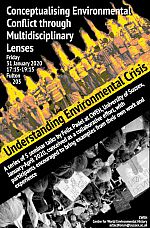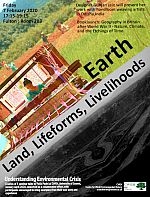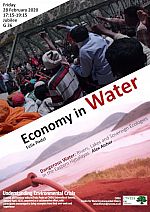DownLockDown
Downlockdown galleryCollage and drawing on paper (42 x 29.7 cm) |
Did |
This series of collage and colour pencils drawing on paper were made in late night sessions during lockdown,
March-May 2020 (Dimensions: 42 x 29.7 cm)
Zuky Serper
CWEH artist in residence
Understanding Environmental Crisis
A series of 5 seminar talks by Felix Padel at CWEH, University of Sussex, January-April 2020, conceived as a collaborative effort, with participants encouraged to bring examples from their own work and experience.
Details of all of the talks in this series:
Understanding Environmental Crisis [PDF 191.18KB]
Past Events
Whose Anthropocene reading group
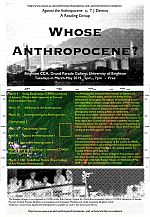 Against the Anthropocene by T J Demos
Against the Anthropocene by T J Demos
A Reading Group
Brighton CCA, Grand Parade Gallery, University of Brighton
Tuesdays in March-May 2019 – 5pm-7pm - Free
More details:
Whose Anthropocene? Poster [PDF 6.68MB]
Whose Anthropocene? Details [PDF 120.16KB]
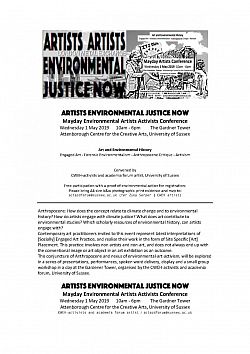 Artists Environmental Justice Now
Artists Environmental Justice Now
Mayday Environmental Artists Activists Conference
Wednesday 1 May 2019 10am - 6pm
The Gardener Tower
Attenborough Centre for the Creative Arts, University of Sussex
Further details: Artists Environmental Justice Now
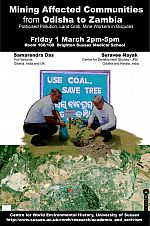 Mining Affected Communities from Odisha to Zambia
Mining Affected Communities from Odisha to Zambia
Politicised Pollution, Land Grab, Mine Workers in Disputes
Friday 1 March 14:00 until 17:00
Brighton and Sussex Medical School, Room 108/109
Speaker: Samarendra Das and Suravee Nayak
Further details: Mining Affected Communities from Odisha to Zambia
Environmentalism as Artistic Intervention
Artists - Environmental - Justice - Now conference (Mayday 2019, The Attenborough Centre) invited practitioners - artists, activists and environmental historians - alongside independent scholars to de-construct the concept Anthropocene. They presented the case for critical querying by art history and aesthetic practice of its visual representations in academic and media circles:
Whose Anthropocene?
Against the Anthropocene (T.J. Demos, 2017) argues that the Anthropocene unleashes slow violence on humans and non-humans. Demos’ call for artists and art theoreticians to recognise the urgency of decolonising nature and respond to climatic change destruction, is echoed in the work we do at the Centre for World Environmental History (CWEH). The book was discussed in a reading group at the Centre for Contemporary Arts – University of Brighton, delivered by the CWEH in the spring of 2019.
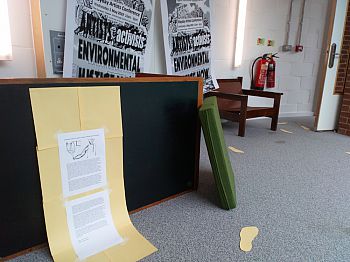
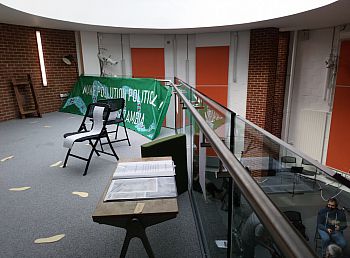
Mayday! Mayday! Conversations-Conservation (exhibition title), Lorna Ough, Artists - Environmental - Justice - Now conference
Fine Art Critical Practice students from the University of Brighton have had an ongoing interaction throughout the years with the CWEH. Their interpretation of the iconography on British Overseas Territories flags offered the conference a reading of histories of subjugation and exploitation.
A socially engaged art practice, takes after Joseph Beuys’ notion of the Social Sculpture: The artist is geomorphing a community out of interaction with people and ideas, producing new landscapes that result in new aesthetic objects, texts and actions.
Parachute a visual artist into a non-art context - such as a university History department or an archive - and expect a new vocabulary, a sentence, new stories. An artist working in Kew Archive uncovered a photograph of white miners in Africa and a report about their respiratory health issues. Only after white miners fell ill, could their African colleagues claim attention to their illness. Her talk in Artists - Environmental - Justice - Now explored themes of environmental racism and working condition.
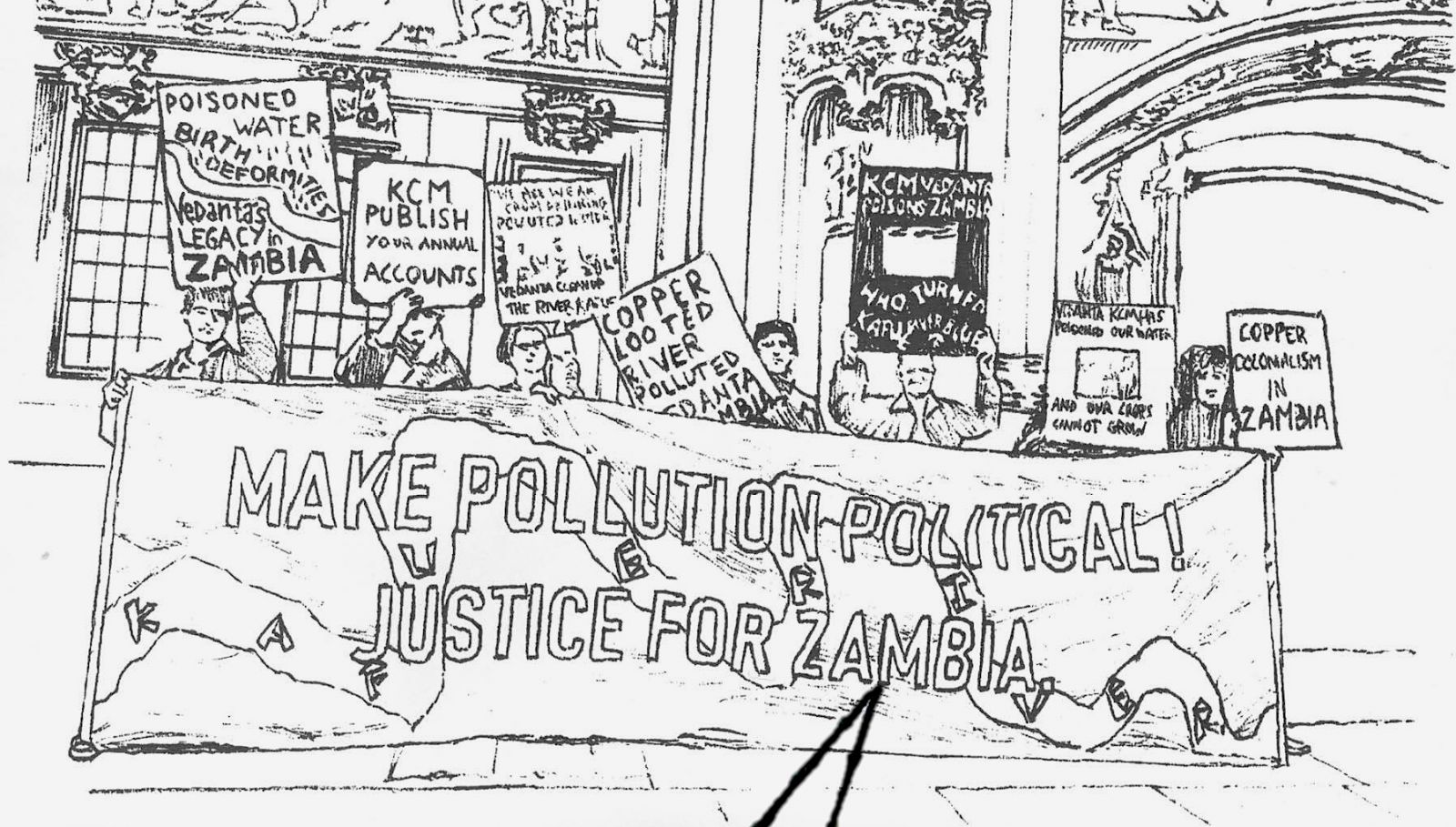
Foil Vedanta Leaflet for Climate School Strike (Detail); drawing of a vigil in front of the Supreme Court / Liz Crane and Al Coffey
The Centre for World Environmental History is a generous host for a successful artist placement. 7 years ago, when Serper joined the centre to help start the Activists and Academia Forum, it has brought together academic scholars and activists, artists, students and campaign organisations alike, to create a working international network that studies the extractive industries, and responds to the social disequilibrium they produce. Being the only trained artist in the team, Serper was also tasked with producing the visuals: Artworks for banners, publicity of Forum gatherings, and newsletters.
A recent interest in the potential of forensic Geographic Information Systems to acquire new body of knowledge for the CWEH, map data for visual representation of case studies and reach new audiences, led Serper to explore geography and GIS. He is part of the Activists and Academia Forum-CWEH programming team, which focuses this year (2020) on a series of talks about the wider context of climate change and of environmental racism, to coincide with academic audience participation and in response to de-colonising the academic curriculum.
- A short history of the Activists and Academia Forum-CWEH
-
Since May 2013 forum research and gatherings highlighted the impacts of mineral extraction on local people and environments in Odisha’s Niyamgiri bauxite, Zambia’s Copper-Belt, Jharkhand iron-ore and coal, Ecuador’s Intag Cloud-Forest and Yasuni-Park gold and oil, rock in Acra Ghana, fracking in East-Sussex. Telling stories of state and corporate slow violence, and voices from ecological conflicts, exposed the real cost of mining, our lifestyle that stretches the Earth's resources. This work supported compensation for polluted communities, evidencing deforestation and land-grab in court cases.
The first international gathering held in 2014 won a British Academy award and launched a series of network events in the following years. The Yasuni ITT Park Initiative in Amazonian Ecuador, a well-attended workshop organised for Paris COP21 (2015), brought together Yasuni indigenous representatives, Rights of Nature advocates, and Yasunidos activists. In 2018 Vedanta’s Billions- Regulatory Failure, Environment and Human Rights report was launched at the Activists and Academia Forum-CWEH. In October of that year, following a Supreme Court legal case brought against UK-based miner Vedanta for polluting River Kafue in Zambia, the company was de-listed from the London Stock Exchange. A critical examination of the contemporary conceptualisation of the Anthropocene in an aesthetic context and in environmental activism was the subject of the 2019 successful reading group Against the Anthropocene and Mayday conference Artists Environmental Justice Now.
Since 2020 attention centred on young people in education. Young people from marginal communities expressed their responses through art activities, thinking about the future. Their experience of climate change in the Anthropocene featured in school projects in Sundarbans, India and Tesoro Escondido, Ecuador, and the Botanical Garden of Kolkata. From 2021 integrating world environmental history and geographic information system (GIS) told stories from Korba, Lanjigarh, and Singhbum, employing GIS scientific measuring of climatic variables and visually mapping data from 50 years of satellite missions. A forthcoming book on extractivism summarises a decade of environmentalism in academia.
Zuky Serper is a GIS analyst and resident artist at the Centre for World Environmental History (CWEH) University of Sussex since 2013. His work on world environmental history GIS and art and education participatory practices is integrated into the activist agenda of the centre, as set by its inspirational founder, environmental historian Richard Grove.












